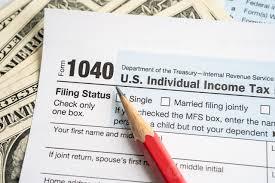Introduction:
Individual Income Tax Return 1040 IRS Form 1040 is the central document used by individuals to file their annual income tax returns in the United States. It allows taxpayers to report their income, claim deductions and credits, and calculate the amount of tax they owe or expect to be refunded.
Why is it Important?
Filing Form 1040 is a legal obligation for most U.S. taxpayers. It ensures compliance with federal tax laws and provides an opportunity to maximize eligible deductions and credits, reducing tax liability.
Who Needs to File Form 1040?
Income Thresholds for Filing
The requirement to file Individual Income Tax Return 1040 depends on your income, filing status, and age. For instance, single taxpayers under 65 must file if their gross income exceeds $13,850 (as of 2023).
Specific Filing Requirements Based on Status
Certain taxpayers, such as those with self-employment income over $400 or recipients of advance premium tax credits, must file regardless of their income levels.
Key Sections of Form 1040
Personal Information
This section captures your name, Social Security number, and filing status, establishing your tax identity.
Income Section
Here, you report all sources of income, including wages, interest, dividends, and capital gains.
Adjustments to Income
Adjustments reduce your gross income, impacting your taxable income. Common adjustments include contributions to retirement accounts and student loan interest.
Tax and Credits
This section calculates your total tax liability after applying eligible credits, such as the child tax credit or education credits.
Payments and Refunds
Here, you report any tax payments made during the year and determine whether you owe additional taxes or qualify for a refund.
Filing Status and Its Impact
Single
Ideal for individuals who are unmarried and do not qualify for other statuses.
Married Filing Jointly
Couples can file together, often benefiting from lower tax rates.
Head of Household
This status offers favorable rates for unmarried individuals supporting a dependent.
Qualifying Widow(er)
Available for two years after a spouse's death if supporting a dependent child.
Deductions and Credits on Form 1040
Standard Deduction vs. Itemized Deductions
Taxpayers can choose between a standard deduction (a fixed amount based on filing status) or itemized deductions (actual expenses like medical costs and charitable contributions).
Common Tax Credits
Popular credits include the Earned Income Tax Credit (EITC), Child Tax Credit, and Lifetime Learning Credit, which reduce your tax liability dollar for dollar.
Common Mistakes to Avoid When Filing Form 1040
Errors in Personal Information
Typos in your Social Security number or filing status can delay processing.
Misreporting Income
Failing to report all income sources, such as freelance work or side gigs, can lead to penalties.
Overlooking Credits and Deductions
Ensure you claim all eligible deductions and credits to maximize savings.
Filing Deadlines and Penalties
Standard Filing Deadline
The deadline for filing Form 1040 is typically April 15th, unless it falls on a weekend or holiday.
Extensions
You can request a six-month extension using Form 4868, but this does not delay your payment deadline.
Consequences of Late Filing
Failing to file or pay on time may result in penalties and interest charges.
How to File Form 1040
Filing Electronically
E-filing is the fastest and most accurate method, offering instant confirmation and quicker refunds.
Mailing a Paper Return
Paper filing is an option, but it involves longer processing times and higher chances of errors.
Tools and Resources for Completing Form 1040
IRS Free File Program
Eligible taxpayers can file their federal taxes for free using this program.
Tax Preparation Software
Platforms like TurboTax and H&R Block simplify the filing process with step-by-step guidance.
Hiring a Tax Professional
For complex tax situations, consider seeking assistance from a certified public accountant (CPA) or tax preparer.
Updates and Changes to Form 1040
Changes in Tax Laws
Stay updated on new tax laws that may impact your deductions, credits, or filing requirements.
COVID-19-Related Adjustments
Recent years have seen special provisions like stimulus payments and pandemic-related deductions.
Conclusion
Filing your Individual Income Tax Return 1040 is an essential step in fulfilling your civic responsibilities and managing your finances effectively. By understanding its key components, avoiding common errors, and leveraging available tools, you can ensure a smooth filing process. Whether you’re filing independently or with professional help, staying informed about updates and deadlines will help you maximize your tax benefits and minimize liabilities.
FAQs
What documents do I need to complete Form 1040?
You’ll need your W-2, 1099 forms, Social Security number, and details of deductions and credits.
Can I file Form 1040 for free?
Yes, eligible taxpayers can use the IRS Free File Program or opt for free versions of tax software.
What happens if I make a mistake on my 1040?
You can file an amended return using Form 1040-X to correct any errors.
How can I check the status of my tax return?
Use the IRS’s "Where’s My Refund?" tool for real-time updates.
When can I expect my tax refund?
Refunds are typically issued within 21 days of e-filing, but delays may occur during peak seasons



